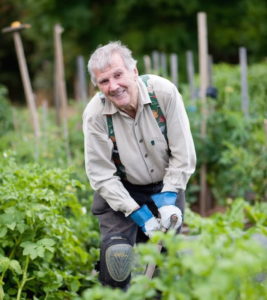Peter Cundall, most known to Australians as the former face of ABC’s Gardening Australia, was a fierce environmentalist who fought for decades to protect Tasmania’s wilderness.

Peter Cundall passed away peacefully last Sunday at the age of 94
The English-born horticulturalist taught us all to love organic gardening, getting our hands in the dirt and growing our own food. He was also a fierce environmentalist who urged environmentalists to “never ever give up”.
Cundall helped establish the Organic Gardening and Farming Society of Tasmania in the 1970s, and as chairman of the Tasmania Wilderness Society fought against the construction of the Bell Bay pulp mill in Tasmania.
The prominent Tasmanian broadcasting and gardening personality who was intensely private passed away peacefully last Sunday at the age of 94.
Here’s what he taught us all about the importance of gardening.
Gardening teaches patience
Gardening teaches us about the importance of slowing down. It teaches us about the importance of patience in an impatient world. In an age of information overload and instant gratification, planting a seed and watching it grow literally forces us to slow down and take note of the little things. Gardening teaches us the importance of caring for something other than ourselves.
Gardening is a mood-booster
Numerous studies have found that gardening has myriad benefits for the mind and soul. It has been found to reduce behavioural problems and increase self esteem, reduce anxiety and depression, improve cognitive function and may reduce the effects of dementia. Studies have also found that gardening helps people overcome addiction.
Gardening is beneficial for the planet
For many people, watching the gradually accelerating effects of climate change is causing increased daily stress levels and a sense of guilt. Ecoanxiety, as it is known, is feelings of “helplessness, depression, fear, fatalism, resignation” caused by “watching the slow and seemingly irrevocable impacts of climate change unfold, and worrying about the future for oneself, children, and later generations”, according to the American Psychological Association.
Gardening is a good way to counteract this feeling, as by growing plants we are contributing in a very small way to help absorb carbon dioxide and creating a habitat for insects, birds, and other small animals to make their home.
Gardening improves community well-being
Community gardens, school gardens and family gardens help strengthen community bonds and foster improved well-being in participants, and help reduce feelings of loneliness.
You could even join a community gardening group – most cities and suburbs have established community gardens available for locals to join. They usually meet once a month or so for social events and to swap seeds and gardening advice.
The Community Garden Australia’s (CGA) map can help you locate local community gardens across Australia.










